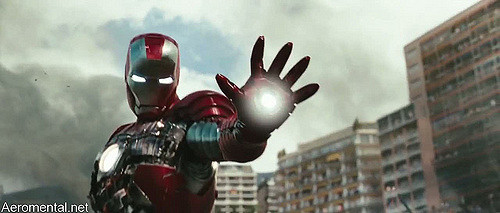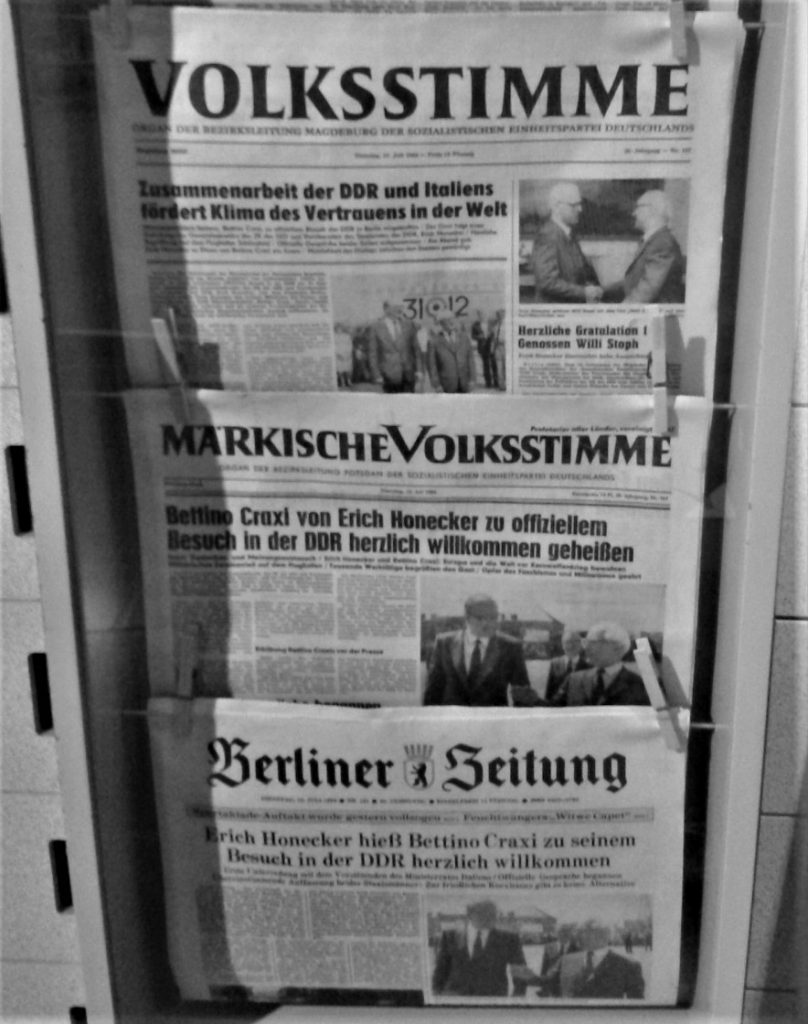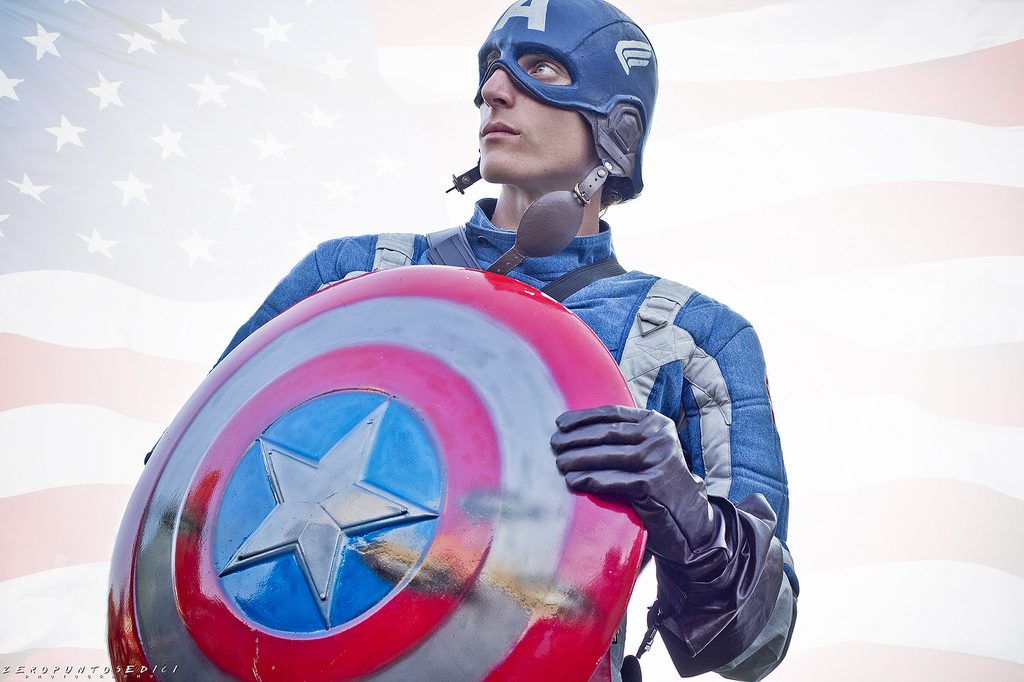When we think of propaganda, we often think of posters urging the nation’s citizens to join the war efforts, or we picture it as a manipulating instrument of totalitarian regimes. But what if propaganda is James Bond’s oldest gadget? What if it is a glitch in Iron Man’s suit?

The lights flicker, then die, and the curtains open. The darkness of the screen is illuminated by the headlights of a car. The image is blurred by falling snow but slowly a dark figure emerges. He waves and the car stops. Two men get out. “Are you the guys from Washington?”, they are asked. They begin to walk away from the car, discussing a huge object that has been discovered in the ice. Once they have reached the site and cut a hole in the surface of the buried object it is ready to be explored from the inside. The blue-tinged light of torches flashes over snow and metal. Then one of the explorers’ torch light falls on something else. He kneels down, wipes away the snow and the frost. And there, under a layer of ice, wearing stars and stripes lies what – or rather who – is described by some, such as director Luc Besson, as a perfect example of modern US propaganda.
It’s A One-Way Street

But before we unleash the argument of whether the pop culture we so love is propaganda, let’s clarify what propaganda is. Usually, the term ‘propaganda’ evokes images of an authoritarian or totalitarian regime, such as the Third Reich, the USSR or North Korea, manipulating its people. Yet, this association is like a film trailer that shows you all the best scenes leaves you with a sensation of disappointment as you walk out of the cinema. It is not entirely wrong, but neither does it show the whole picture. While totalitarianism is, more often than not, accompanied by propaganda, it is by no means a necessary requirement for the use of propagandistic strategies.
Propaganda, in a nutshell, is biased or misleading, if not entirely false, information that is systematically spread to promote a political doctrine, aim or world view. Whether it comes in the form of posters, propaganda films, fake news or memes, propaganda is often aimed at leading the audience into a one-way street of information, or towards one particular opinion that is produced and reproduced again and again through creating a ‘funnel of information’.
How Bowie Brought Down the Berlin Wall
New York Times columnist David Brooks expressed his conviction that art can bring about social and political change through ‘deep spiritual and emotional understanding’, and that the world can be changed ‘by changing people’s hearts and imaginations’. And surely, anybody who ever felt inspired or moved by a novel or a film will agree that pop culture can have a mimetic effect on its audience, and that it is therefore plausible that our entertainment media can provide fertile ground for  propaganda of varying subtlety. Yet, while almost everything we do is in some way political or has an effect on politics, not all of our actions are based on political intentions. It is true, there are political elements to the stories of Star Wars, Captain America and the like. But are they a form of propaganda, or is it merely entertainment that borrows from political reality? Well, we will get to that later.
propaganda of varying subtlety. Yet, while almost everything we do is in some way political or has an effect on politics, not all of our actions are based on political intentions. It is true, there are political elements to the stories of Star Wars, Captain America and the like. But are they a form of propaganda, or is it merely entertainment that borrows from political reality? Well, we will get to that later.
Perhaps the best way to demonstrate pop culture’s propagandistic merit and political impact is by pressing rewind to rewatch the Cold War. The Cold War was without doubt an ideological conflict. Due to its nature it seeped into almost every aspect of life, including books, film and music, enabling culture to be used as an ideological instrument. Sergei Eisenstein’s films burst with Communist propaganda, while Ian Fleming’s James Bond novels propagate anti-Communist ideology and the films, according to novelist and former spy John le Carré, promote Capitalist ‘consumer goods ethic’, and portray the comfort and prosperity of the West in contrast to the debt-infested Soviet Union.
During the 1950s and the 1960s the CIA sponsored artists such as Pollock, Rothko and de Kooning to showcase Capitalism’s freedom and creativity, and the BBC’s adaptation of Nineteen Eighty-Four was applauded by a number of MPs as a commendable effort of bringing ‘home to the British people the logical and soul-drenching consequences of the surrender of their freedom’. Meanwhile, Whitehall convinced the BBC not to broadcast The War Game, a film about the aftermath of a nuclear attack that showed scenes of British soldiers burning corpses and people clashing with the police during food riots.

Towards the end of the Cold War Western pop culture, and in particular British music had become a symbol of freedom, fun, self-expression and modernity. One event that illustrates this, is a concert that took place in West Berlin in 1987. During a three-day rock festival David Bowie played on a stage right next to the Berlin Wall. Rumor has it that some of the speakers were deliberately turned towards East Berlin. If this is true, we do not know, yet, what we do know, is that during an interview in 2003 Bowie remembered that there ‘were thousands on the other side that had come close to the wall. (…) And we could hear them cheering and chanting from the other side’. In the middle of the concert he addressed the people in East Berlin, saying : ‘We send our best wishes to all our friends who are on the other side of the wall’ which was followed by ‘Heroes’, the birthplace of which was the divided Berlin. Meanwhile, many of the East Berliners had begun to chant ‘The Wall must fall!’. It was the first of many riots of a heightened level of intensity and led to more than 200 arrests.
A Marvel-ous Example of Propaganda
Let’s leave the past in the past, and resume our story. Not long ago director Luc Besson criticised the Marvel and DC franchise of being US propaganda. He depicted Captain America as a tool to show the US’s supremacy and greatness. And while Besson’s assessment was met with a thunder of criticism of Asgardian proportion, it is undeniable that the origin of Captain America resides in the propagandistic endeavour to bolster US support and morale during World War Two. And this is only the prequel to the debate if Marvel and DC are the mouthpiece of propaganda.

It is not uncommon for the Pentagon to support pro-military blockbusters. The opportunity to rent military equipment is given on the condition that the Pentagon approves of the film script, or even has influence over it. Naturally, the films receiving the Pentagon’s support portray the military in a positive light. Among these are all Iron Man films, about which Air Force captain Christian Hodge said that upon release the ‘Air Force is going to come off looking like rock stars’. The Avengers, on the other hand, were considered too silly to be eligible for the privilege to rent equipment from the army, in addition to the Pentagon not approving of S.H.I.E.L.D.
Yet, both in the production but in the story of Iron Man itself we can find content that makes it difficult to dismiss offhand the claim that there is propaganda within the Marvel and DC universe. Not only do we find the creation of an enemy image – in the 1960s Vietnamese Communists, nowadays Middle Eastern terrorists but a fascinatingly consistent reversal of actions that creates a contrast between fiction and reality.

On screen we can watch Tony Stark being captured by members of an Islamist organisation who try to force him to build weapons for them. Tony Stark, however builds an armour suit that allows him to escape and return to the US where he perfects the suit and teams up with the military to beat the evil that threatens the US’s freedom and security. Yet, it was actually the US military that captured al-Qaeda and Taliban members in Afghanistan and exposed them to ‘harsh interrogation techniques’.
Iron Man. That’s kind of catchy.
While the prequel to the discussion about propaganda in the Marvel and DC franchise is still in the making, and the debate continues whether our beloved and admired superheroes are mouthpieces of propaganda or mere innocent pop culture, we cannot dismiss the linkage between pop culture and politics. No matter if pop culture borrows from political reality, acts as social and political criticism, or is (mis)used as propaganda: whether it functions as mimesis and catharsis, or purely is entertainment, we cannot refute its usefulness in passing on propagandistic doctrines, as well as in making moral claims and holding a mirror up to nature. And just as we perhaps should carefully evaluate what we call propaganda, we should approach the entertainment served to us with a sharp and critical mind.
By Merle Emrich
Photo Credits
Propaganda, DocChewbacca (CC BY-NC-SA 2.0)
IRON MAN… or is it?, Chris Blakely (CC BY-NC-ND 2.0)
Iron Man 2 Trailer 2 – 00242, Daniel Sempértegui (CC BY-NC-ND 2.0)
Captain America, Sara Zizza (CC BY-NC-ND 2.0)
L’Odéon, Alexandre Chassignon (CC BY-SA 2.0)
GDR newspapers, Merle Emrich, All Rights Reserved
Berlin Wall, Merle Emrich, All Rights Reserved










